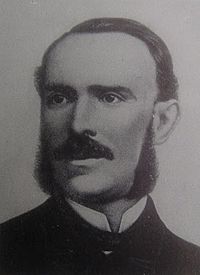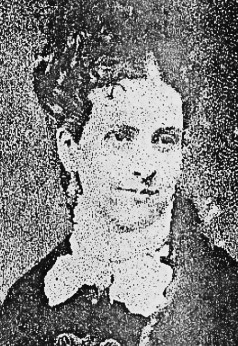Nataniel Aguirre facts for kids
Quick facts for kids
Nataniel Aguirre
|
|
|---|---|
 |
|
| Born | Nataniel Aguirre González (sometimes his second surname is represented as: González-Prada or González de Prada) October 10, 1843 Cochabamba, Bolivia |
| Died | September 11, 1888 (aged 44) Montevideo, Uruguay |
| Occupation | Writer, politician, diplomat, lawyer |
| Genre | Novel |
| Notable works | Juan de la Rosa |
| Spouse | Margarita Achá |
| Children | 9 |
| Relatives |
Miguel María de Aguirre (Father)
María Manuela González de Prada (Mother) |
Nataniel Aguirre was a very important Bolivian writer, lawyer, and politician. He was born in Cochabamba, Bolivia, on October 10, 1843. He passed away in Montevideo, Uruguay, on September 11, 1888. Many people believe his most famous novel, Juan de la Rosa, is one of the best novels from the 1800s in Spanish America.
Contents
Growing Up in Bolivia
Nataniel Aguirre was born in a place called Hacienda de Huayllani. This was in the department of Cochabamba. He was the fourth of five children in his family. His father, Miguel María de Aguirre, was a financier and politician. Nataniel's mother, María Manuela González de Prada, sadly died when he was only three years old.
He finished high school in Sucre in 1857. Soon after, he met Margarita de Achá. She was the daughter of the president, José María de Achá. Nataniel really admired Margarita. He even wrote a poem for her. They got married on March 30, 1864, after he finished law school. They had nine children together. One of their sons, José, also became a writer and politician.
Studies and Political Life
Nataniel Aguirre studied law at the Universidad Mayor de San Simón. He graduated in 1864. While he was a student in 1862, he started a newspaper called El Independiente. He wrote a regular column for this newspaper.
In 1864, he became a secretary for Bolivia's group in Lima, Peru. His mother's relatives, the González Prada family, helped him meet important thinkers and politicians in Peru. That year, he wrote a play called Visionarios y mártires. It was about two Peruvian heroes, Manuel Ubalde and Gabriel Aguilar. They had dreamed of independence for their country in Cuzco in 1805.
The next year, he went back to Bolivia. He wanted to help his father-in-law, who had been removed from power. This happened because of a military takeover by Mariano Melgarejo.
After the death of Agustín Morales, Nataniel joined the Constituent Assembly of 1871. This was a group that helped write the country's laws. He took part in important discussions about how the government should be run. He eventually supported the ideas of the liberals. He represented Chapare Province and helped write its constitution in 1872. He was also a member of the President's Council of State for Tomás Frías in 1872. Later, he became the prefect of Cochabamba in 1879.
In 1879, he joined the War of the Pacific. He led a group called Vanguardia. He also led the Convention of 1880. This group confirmed Narciso Campero as the new president. Nataniel was then made Minister of War. After that, he became the Minister of Foreign Relations. In this role, he helped negotiate a peace agreement with Chile in 1884. Even though he personally wanted to keep fighting, he worked for peace.
Nataniel Aguirre believed that land should be shared more fairly. He strongly supported the rights of the indigenous people. He once said, "We will make the poor Indian a citizen like us." In 1885, he became the leader of the Liberal Party in Cochabamba.
Famous Writings
Nataniel Aguirre was part of a group of writers called the Generación de 1880. Some of his important works include Represalia del Héroe and Bolivia en la Guerra del Pacífico. His most famous work is the novel Juan de la Rosa. This novel was first published with a longer title: Cochabamba. Memoirs of the Last Soldier of the Independence Movement. Some people even doubted who wrote it at first. However, experts agree it is a very important book in Bolivian literature. He also wrote plays and poems.
Later Years and Legacy
Nataniel Aguirre died in Montevideo, Uruguay. He was on his way to Brazil at the time. The government had sent him there as a special representative. His body was brought back to Cochabamba, Bolivia. He is now buried in the public cemetery there.
Main Works
- Visionarios y mártires (1864): A play about Peruvian heroes Manuel Ubalde and Gabriel Aguilar.
- Represalia de un héroe (1868): A play about the patriot Nicolás Bravo from Mexico.
- El general Francisco Burdett O'Connor (1874): A book about an Irishman who stayed in Bolivia.
- Unitarismo y federalismo (1877): A book about different government ideas.
- Bolivia en la Guerra del Pacífico (1882–83): A book about Bolivia's role in the War of the Pacific.
- El Libertador: comprendio histórico de la vida de Simón Bolívar (1883): A historical book about Simón Bolívar.
- La bellísima Floriana (1886): A novel.
- Don Ego: A short story.
- Juan de la Rosa. Memorias del último soldado de la independencia: His most famous novel, first published in 1884.
See also
 In Spanish: Nataniel Aguirre para niños
In Spanish: Nataniel Aguirre para niños
 | Emma Amos |
 | Edward Mitchell Bannister |
 | Larry D. Alexander |
 | Ernie Barnes |


